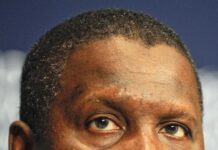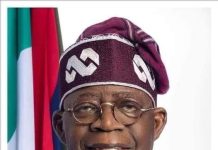Did you watch the interview granted about 10 days ago by Labour and Employment Minister, Dr Chris Nwabueze Ngige, to Channels Television NewsNight program anchored by Ladi Akeredolu Ale? If you didn’t, then you missed something. But not to worry, you can still get to watch it online.
I have decided to call it Sermon on the Mountain, according to Dr Ngige. It was bold, frank, forthright, and something to be highly commended.
The medical doctor-turned-politician and now Conciliator General of the Federation parried no question. He answered them all. And most important was that he spoke boldly about the Indigenous People of Biafra (IPOB) and the Eastern Security Network (ESN) at a time most leaders of thought and people of influence in the region were still calling them ‘Unknown Gunmen,’ cowering under their beds, afraid of speaking the truth to a rebellion gone awry.
The first person I recall who spoke boldly about IPOB/ESN was Gov Dave Umahi of Ebonyi State, when he addressed the Press at the Presidential Villa some weeks back. He said he knew who the unknown gunmen were. And he mentioned the group, saying he didn’t agree with their tactics, but he understood why they were doing what they were doing.
Another person who came boldly to sue for peace was former Abia State Governor, Orji Uzo Kalu. He urged the young men to sheathe their swords, and stop the self- immolation spree they were embarking on.
Some other interest groups issued statements that were tepid, neither here nor there, while others spoke from both sides of the mouth. It was obvious that they didn’t want to condemn the secessionist group, lest they become targets themselves. The group seemed impudent and irreverent enough to confront anybody.
But Ngige came out smoking, calling a spade a spade. He held nothing back, firing from the hips, asking for no quarter, and getting none. I was, therefore, not surprised when some days later, Governors of all the States in the South East came out as one body, denouncing secession, and expressing faith in a united Nigeria. Ngige and some few others before him had shone the light, and people were finding the way.
Let’s plumb the depths of the interview, and see what the former Anambra State Governor, ex-Senator, and two-time Minister said.
He was asked to comment on the security situation, first in the country generally, and then South East in particular.
The Minister made it clear that agitation for secession had always been there since return to democratic rule in 1999, under Chief Olusegun Obasanjo as President.
There was MASSOB led by Raph Uwazurike, which wanted the sovereign state of Biafra, and from which some people broke off to form IPOB. There was also Oodua Peoples Congress (OPC) in the West, and Arewa Peoples Congress up North. There was also the remnant of National Democratic Coalition (NADECO), which repudiated the 1999 Constitution, and vowed to write a new one for the country.
“As the economic situation degenerates in the country, so does security degenerate,” the Minister submitted, adding: “The situation now is not as uncontrollable as some people paint it. The current government is trying its best.” Very courageous, if you ask me.
Ngige told his interviewer that he had been Governor, Senator, and now Minister since 2015, “and I can safely tell you that we need an ad-hoc, mid-term, and long term funding plan for security.”
Then to the big elephant in the room. Secessionist agitation by IPOB and its military wing, the ESN. The Minister said he was sorry for them, particularly as someone who was a soldier, and saw action during the Nigeria/Biafra Civil War.
“When I see those gathering Ak-47 from slain policemen to fight a separatist war, I laugh. MASSOB was non-violent. IPOB also broke off from MASSOB and was non-violent initially. There’s nothing wrong with referendum to determine where you want to be, as people would vote. But to want to use force, attack police stations, kill policemen, burn INEC facilities and correctional centers, you are only putting people in harm’s way. It is not good.
“Terming everybody in South East as IPOB member is not good for investment and business. Before this government came in 2015, bomb explosions were going off everywhere, including in Abuja. Boko Haram was everywhere, before they were chased out and confined to the North East. The government has done so well.”
The question was then asked whether the Igbo were truly marginalized in terms of political and economic power. The Minister paused, and said it was a tricky situation.
“I’ve noted the way appointments go, especially in the security services. There are some positions you must fill based on seniority, competence, and loyalty to the Commander-in-Chief. I’ve discussed this one-on-one with Mr President a couple of times. Seniority, loyalty and competence are very cardinal. But all these things can be discussed without necessarily taking up arms.”
The question turned to whether the South East had been marginalized in terms of infrastructure, and you see Dr Ngige in his elements.
“Nobody can say the South East has been shortchanged,” he posits. “It’s ignorance. What this government promised, it has fulfilled.
“When it got to office, several states were assisted to clear backlog of salaries. The South East was not left out. Policemen who served in Biafra, and who had been denied pensions got their entitlements. The Enugu-Port Harcourt Expressway, which had failed, and one lane had been turned to farmland, was rebuilt. A journey of three hours has now become 40 minutes.
“The Enugu-Onitsha road, passing through Awka, not touched by many governments before now, is being done. So also Enugu-Amansea, into Oji River. Enugu-Abakaliki is completed. Owerri-Aba-Umuahia is being done. Okigwe-Awudi to Ugah is being done. So also Onitsha to Nnewi.
“The Second Niger Bridge is the icing on the cake, costing N236 billion. That bridge will give economic life to the South East, South South, and part of North Central. It is about 53% done, and work is going on vigorously. Yet some people still say they are not remembered in infrastructure.
“The zone has produced Senate President for eight years, produced Deputy Senate President, Deputy Speaker, and Secretary to the Government of the Federation. Yet they say no appointments.
“Enugu Airport had the worst runway before. Today, it is now international in name and standard. Night landing is possible there now, and with the installed Instrument Landing Systems, planes can land there in the worst weather. And this was done by a President they say hates them.”
Dr Ngige attributes the antipathy to the President and the All Progressives Congress in the zone to the propaganda of the People’s Democratic Party (PDP).
“The party had thought no one else could make inroad into the zone, till I broke the jinx in 2011: winning the Senate seat on the platform of the then Action Congress of Nigeria (ACN), which they called a Yoruba party. It was the greatest fight of my political life.”
He laments that separatist agitation became stronger in the region when APC began to govern two states, declaring: “There must be a limit to politicking…some people don’t know when they are crossing boundaries.”
Dr Ngige describes President Buhari as a democrat, who is afraid of breaching the Constitution, adding that “he’s a willing horse, and people want to ride him to death, which is not fair.”
To another big one. Would the Minister subscribe to President of Igbo extraction in 2023?
Why not? He canvasses a return to the Sani Abacha 1995 Constitution that prescribes rotational presidency with single term of five years.
“Let’s use it for 30 years, and the six zones would all have tasted the Presidency. We would heal all wounds, and have a more stable polity..
“But I believe APC won’t be unfair to the southern block of the party, which has three zones. We will sit down and discuss.”
It is said that dynamite comes in small packages. That was what the Minister proved by that interview. A human dynamo, not afraid to voice his convictions.
*Adesina is Special Adviser to President Buhari on Media and Publicity





